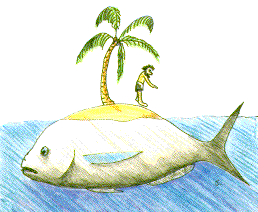Economic Contribution to Ecosystem-Based Management in the Birds Head Seascape, Papua, Indonesia
Objective
Raja Ampat, in Eastern Indonesia, boasts the highest coral reef biodiversity in the world, and is therefore an important area not only for fishing and tourism, but also for conservation. In an effort to understand this ecosystem, development of an ecosystem based management (EBM) framework was initiated by Conservation International, The Nature Conservancy, and World Wildlife Fund. The economic component of this project was our particular focus. Specifically, our objective was to look at the economics of unregulated and illegal fishing in Raja Ampat. An unregulated anchovy fishery and the illegal use of dynamite and explosives in the region were studied.
Sumaila, U. R., and D. Pauly. (2006). Catching more bait: a bottom-up re-estimation of global fisheries subsidies. Fisheries Centre Research Reports Vol. 14, No. 6 Pages: 114pp.
This report on fisheries subsidies explores a theme that may seem baffling to the uninitiated: all but the fisheries industry seem to think subsidies are bad, yet they survive only because they are subsidized. This report does is differentiate between subsidy types – fuel and non-fuel, subsidies that are considered ‘good’, ‘bad’ and ‘ugly’.
Sixth Meeting on Game Theory and Practice Dedicated to Development, Natural Resources and the Environment
July 10-12, 2006: 6th Meeting on Game Theory and Practice Dedicated to Development, Natural Resources and the Environment – hosted by IAMZ-CIHEAM (Zaragoza, Spain)
Congressional (Hill) Briefing by Rashid Sumaila and Andrew Rosenberg
June 15, 2006: Lenfest Ocean Program Rebuilding Depleted Fish Populations: Progress, problems and financial impacts – Congressional (Hill) Briefing by Rashid Sumaila and Andrew Rosenberg
Marine Ecosystem Valuation Workshop
May 8 – 12, 2006: Marine Ecosystem Valuation Workshop, Pattaya, Thailand. Tentative Workshop Programme
Ecopath with Ecosim Workshop
April 18 – 22, 2006: Ecopath with Ecosim Workshop, ACCRA, Ghana.
Raja Ampat Ecosystem Based Management Workshop
April 10 – 14, 2006: Raja Ampat Ecosystem Based Management Workshop, Bali, Indonesia.
Estimating the Cost to Fisheries of Marine Mammal Critical Habitat Designations in the Eastern North Pacific
Objectives:
This research will develop and apply methods for estimating the cost to the North Pacific groundfish fisheries of current SSL critical habitat closures by major fishery and gear group with detailed temporal and spatial scales relevant to management decisions.
Development of a Selective Breeding Program for the Bamfield Huu-Ay-Aht Community Abalone Project
Objectives:
1. To develop a Selective Breeding Program for the Bamfield Huu-Ay-Aht Community Abalone Project (BHCAP) including a multi-trait selection index;
2. To determine which traits are economically important and their relative importance so that they 3. can be weighed appropriately in the Selection Index;
To measure these traits on individually-tagged hatchery-bred animals;
Economic Assessment for B.C. Salmon Aquaculture
Objectives:
The general objective of this research is to examine the profitability of salmon aquaculture operations by highlighting the economic impacts of disease problems on aquaculture producers and wild salmon fisheries. Salmon aquaculture in British Columbia (BC) will be used as a case study, and sea lice will be used as a representative disease. The specific objectives are:
1. To examine the profitability of salmon aquaculture operation under “normal” conditions;
2. To estimate the economic costs of disease to salmon farmers;
3. To examine if disease has economic impacts on wild salmon fisheries; if it does, then examine what the economic impacts will be;
4. To explore the profitability of salmon aquaculture operation when economic impacts of disease are internalized.

